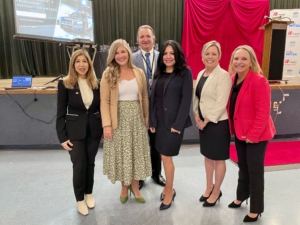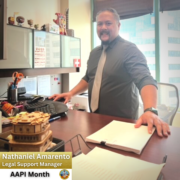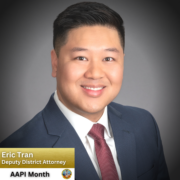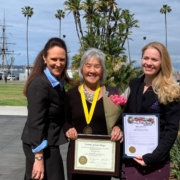Defendant Sentenced to Prison in 1974 National City Cold Case Murder
San Diego County District Attorney Summer Stephan announced today that Carlin Cornett, 70, was sentenced to five years-to-life in prison on June 7, for the 1974 murder of Christy Bryant, a former Marine and 7-Eleven clerk. Bryant was stabbed more than 30 times in the back room of the store during her night shift in National City.
“When a murder is unsolved for decades, it takes an enormous toll on the victim’s loved ones, but now the family of Christy Bryant have a measure of justice after many years of mourning their loss,” DA Stephan said. “I am grateful to our Cold Case Unit and detectives in the National City Police Department who worked tirelessly on this case until it was solved, and the killer was brought to justice.”
The case was a priority for National City Police.
“The National City Police Department would like to thank every law enforcement agency that assisted us with this investigation,” said National City Police Chief Jose Tellez. “This collaboration led to the arrest and conviction of a dangerous murder suspect. The exemplary work performed on this nearly 50-year-old case highlights the National City Police Department’s unwavering commitment to solve cases and to hopefully give families of victims a sense of closure and justice.”
Cornett pleaded guilty to second-degree murder on April 26. In 1974, the punishment under the law for second-degree murder was five years to life in prison.
The case was solved with the DA’s Cold Case Homicide Unit working in collaboration with the National City Police Department, which exhausted every lead and never gave up. Their work was possible through the grant-funded Cold Homicide and Research Genealogy Effort, (CHARGE) which applies investigative genetic genealogy to cold case homicides led by the DA’s resident genealogist Deputy District Attorney Laura Tanney.
On July 31, 1974, Bryant was working the overnight shift at the 7-Eleven on Highland Avenue in National City when she was attacked. After being stabbed more than 30 times, she died at the scene. During the struggle, the defendant cut himself with the knife and left a blood trail as he fled the store. The blood was unidentified for almost 50 years until the National City Police Department in collaboration with CHARGE applied the new tool of investigative genetic genealogy to the unidentified blood. An investigative lead was generated, and the defendant was ultimately identified as the attacker through a standard DNA test.
The District Attorney’s Office commended the National City police department for their outstanding investigative work on this case over the many years it was unsolved, especially retired detectives Raymond Estrada and David Bavencoff, and current Sgt. Mark Segal.
This case was prosecuted by the team leader of the DA’s Cold Case Homicide Unit, Deputy District Attorney Chris Lindberg.



 “I want to thank Mothers Against Drunk Driving for their years of advocacy and education on the harm and loss that driving under the influence causes,” said DA Stephan. “This recognition by MADD of Deputy District Attorney Hailey Williams as Prosecutor of the Year and DA Victim Advocate Shanda Torres as Outstanding Advocate is very special to our entire DA team that fights for justice on behalf of crime victims and our community. Unfortunately, DUI homicides have increased in recent years, resulting in the tragic deaths of far too many in our community. Prosecutors like Hailey are helping to deliver a level of justice for the victims and their families, along with the compassionate assistance of Victim Advocates like Shanda. I am very proud to have them both on our team and I know that this award is very well-deserved. I also want to offer our thanks and congratulations to all the other awardees that are making a difference.”
“I want to thank Mothers Against Drunk Driving for their years of advocacy and education on the harm and loss that driving under the influence causes,” said DA Stephan. “This recognition by MADD of Deputy District Attorney Hailey Williams as Prosecutor of the Year and DA Victim Advocate Shanda Torres as Outstanding Advocate is very special to our entire DA team that fights for justice on behalf of crime victims and our community. Unfortunately, DUI homicides have increased in recent years, resulting in the tragic deaths of far too many in our community. Prosecutors like Hailey are helping to deliver a level of justice for the victims and their families, along with the compassionate assistance of Victim Advocates like Shanda. I am very proud to have them both on our team and I know that this award is very well-deserved. I also want to offer our thanks and congratulations to all the other awardees that are making a difference.” Deputy DA Hailey Williams was nominated by Deputy DA Laura Evans of the DA’s DUI Homicide Unit. Williams started prosecuting DUI homicide cases in 2019, when she was assigned to assist the unit as the numbers of DUI-related deaths in San Diego were on the rise. Despite maintaining a general felony case load in addition to DUI cases, Hailey welcomed the role and excelled in it. She has handled 10 or more of these tragic, serious cases, sentencing many defendants to multiple years in state prison. For instance, in 2022, Hailey went to trial on a difficult gross vehicular manslaughter case in which the defendant was high on methamphetamine and killed his passenger. Hailey’s skills at presenting the facts of her case and cross-examining defense witnesses resulted in a guilty verdict on every charge within a day of deliberations.
Deputy DA Hailey Williams was nominated by Deputy DA Laura Evans of the DA’s DUI Homicide Unit. Williams started prosecuting DUI homicide cases in 2019, when she was assigned to assist the unit as the numbers of DUI-related deaths in San Diego were on the rise. Despite maintaining a general felony case load in addition to DUI cases, Hailey welcomed the role and excelled in it. She has handled 10 or more of these tragic, serious cases, sentencing many defendants to multiple years in state prison. For instance, in 2022, Hailey went to trial on a difficult gross vehicular manslaughter case in which the defendant was high on methamphetamine and killed his passenger. Hailey’s skills at presenting the facts of her case and cross-examining defense witnesses resulted in a guilty verdict on every charge within a day of deliberations. Victim Advocate Shanda Torres was nominated for the award by MADD San Diego Victim Service Specialist Nicole Jupiter for her ability to assist with Spanish speaking families and being a helpful resource for MADD, responding promptly any time the organization inquires about a case.
Victim Advocate Shanda Torres was nominated for the award by MADD San Diego Victim Service Specialist Nicole Jupiter for her ability to assist with Spanish speaking families and being a helpful resource for MADD, responding promptly any time the organization inquires about a case.






